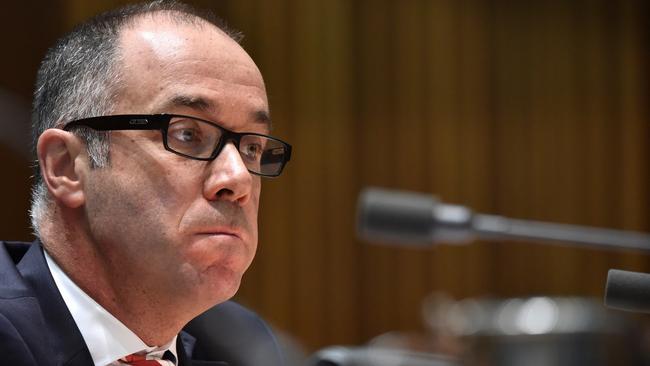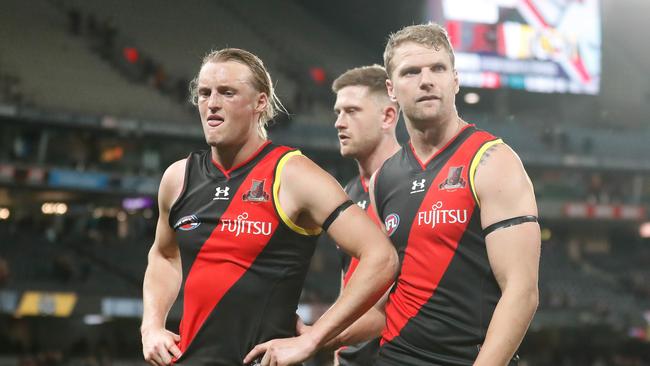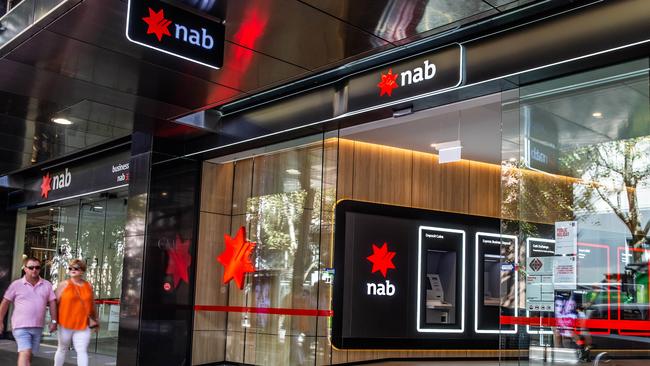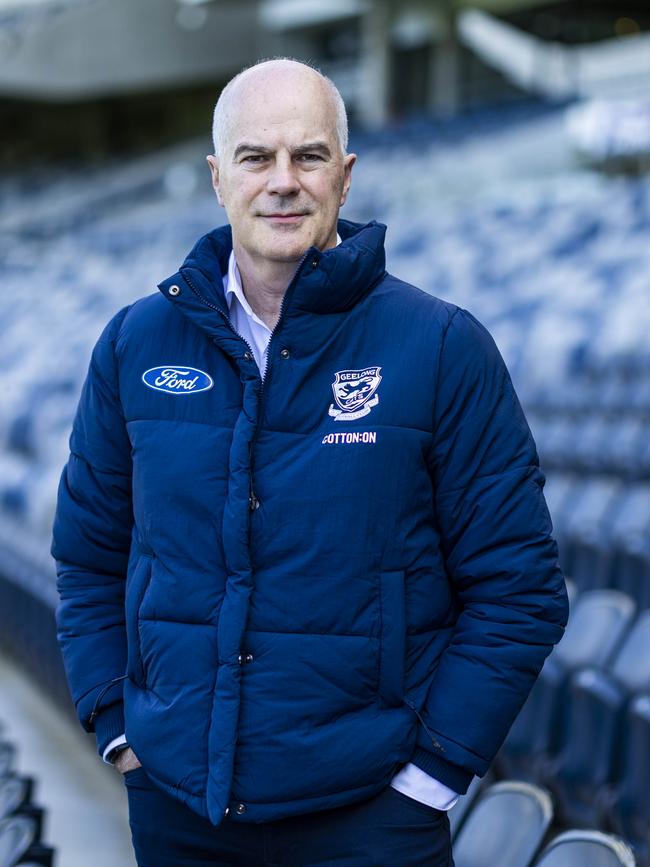
One of the biggest lessons coming out of the long history of fallen bank bosses looking to resurrect their reputations is that their first public step is the most important.
Beyond the off-field controversy surrounding Andrew Thorburn’s 24-hour stint as Essendon Football Club chief executive, the question remains why this former big bank boss would nominate himself for the full-time role in the first place? Who advised him this was a good idea?

The shadow of the financial services royal commission still looms large, but the brutal world of full time sports administration is not the way for a former bank boss to rebuild a reputation after a professional fall from grace. Thorburn resigned from the Essendon job on Tuesday night following a backlash over the views on abortion and homosexuality from the Melbourne-based church he chairs were aired.
In footy clubs – and AFL is no exception – the real control sits with the chair or president, with the CEO there mostly to balance the books, build the membership drive and keep the administration running smoothly.
It is a low-profile job all about toiling away in the shadows. And for a long-underperforming but widely supported foundation club like Essendon the rebuild will be even more demanding.
The standout to this is the well-regarded Richmond CEO and former player Brendon Gale, who has built his leadership skills alongside his reinvigorated club.
The key performance driver of success for a footy club remains outside your control. Even the hiring and firing of the coach, something that ultimately influences whether a club succeeds on the field, comes down to the board.

One former top bank executive shuns all professional board roles that come his way.
“If you can’t run it, don’t put your signature to it,” he says.
By Thorburn taking on an administrative job at a club that last year generated $56m in annual revenue, the optics of the power imbalance were in plain sight.
Thorburn is a three-decade career banker with senior roles at Commonwealth Bank, St George Bank before running NAB’s New Zealand business and then becoming the outside candidate to take on the top job at the Melbourne-based bank in 2014.
NAB is one of the top 30 banks in the world – including when Thorburn was running it. The bank is highly regulated, it employs tens of thousands of people across several countries and has a balance sheet running into the hundreds of billions of dollars. His skills should have been put to use helping to set the processes, measurements and risk framework for rebuilding a club and this comes from the board.
Australian bank bosses are well remunerated, so a post-career resurrection is all about reputation. Indeed in the past seven years at NAB Thorburn was paid a total of $29.1m, according to statutory disclosures. In addition he was sitting on nearly 321,000 shares in NAB when he left in 2019. Today those NAB shares would be worth $9.8m and pay almost $500,000 in dividends every year.
But as an Essendon CEO, Thorburn – who in his last year at NAB was paid $4.4m – would have been reporting to chairman David Barham, a former mid-ranked media executive. After years of turmoil and turnover, the Essendon boardroom is relatively light on in much-needed business experience and Thorburn would soon expose that.
The people Thornburn once towered over now hold the power at other clubs. In Geelong, Thorburn’s former NAB chief financial officer Craig Drummond is chairman. (Drummond left the bank in 2016 to become the chief executive of Medibank, before retiring from the role last year).

Collingwood’s president is former Channel 9 executive and former Carsales.com.au chairman Jeff Browne. He recently replaced the long-serving restructuring specialist Mark Korda (who remains on the Collingwood board). At Richmond investment banker John O’Rourke is set to become the new chairman, stepping into the role following the success of corporate lawyer Peg O’Neal.
In Sydney, another investment banker Andrew Pridam oversees the Swans, while high-profile director and former infrastructure specialist Tony Sheppard is the chairman of the Giants. On it goes.
While Thorburn made tough calls early as chief executive at NAB by exiting legacy businesses, his career came to a sudden end after being called out in the findings of the Hayne royal commission. NAB’s then-owned MLC unit had come under fire for collecting nearly $100m in fees but providing no service under his watch.
Hayne pain
During the hearings, Thorburn largely dismissed the charging of fees for no service as a product of poor technology and carelessness.
In his findings, royal commissioner Kenneth Hayne issued the damning conclusion that after hearing from both Thorburn and NAB chair Ken Henry he “was not persuaded that NAB is willing to accept the necessary responsibility for deciding, for itself, what is the right thing to do, and then having its staff act accordingly”. The two NAB names were the highest-profile casualties of the royal commission launched by the then Turnbull government.
Thorburn was given the option to resign by the NAB board in February 2019 just days after the Hayne report was released. Henry resigned shortly after.
Former Australian bank bosses have to consider their post-banking careers wisely and most start with a low-profile position taking up a collection of non-executive roles. Legendary former NAB chief Don Argus quickly went on to become BHP chairman. Former ANZ boss John McFarlane chaired Barclay’s in the UK and now chairs Westpac. The well-regarded former Westpac and ANZ senior executive Phil Chronican now chairs NAB.
Thorburn had been on the way, taking on similar behind-the- scenes roles, including a lucrative post as senior adviser to Boston Consulting Group, and he is chairman of the Oliver Yates-impact investment fund Sentient. He is also chair of specialist aged and disability care training start-up Catalyst, in addition to his role as chairman of the City on a Hill church which is at the heart of the controversy.

Former Commonwealth Bank chief Ian Narev felt he had more to give as a relatively young executive. He chose wisely after being forced out of the nation’s biggest bank in the midst of the massive Austrac money laundering legal action. Narev kept quiet for more than a year before resurfacing in the newly created role of chief operating officer of jobs website Seek. Some 18 months later Narev was, as widely expected, named Seek CEO.
Andrew Hagger, the former boss of NAB’s troubled MLC wealth management unit who also resigned following exposure from the Hayne royal commission, quietly re-emerged as the powerful chief executive of Andrew Forrest’s investment foundation Minderoo
Former Westpac chief executive Brian Hartzer, the highly-experienced international banker who was forced to resign in the wake of that bank’s own Austrac crisis, took his time in taking a public role but still faces a challenge.
He became chair of under-pressure buy now, pay later outfit Beforepay 18 months after leaving as Westpac CEO. The poor market performance of the entire BNPL sector could act as a shadow on his post-banking career.
In a statement following his Essendon resignation Thorburn said the offer of the CEO role was a “profound honour” adding that the club “was not as broken as feared, and that with leadership and focus, could rebound strongly”. However he said it “became clear to me that my personal Christian faith is not tolerated or permitted … I was being required to compromise beyond a level that my conscience allowed”.
The saga could have been avoided by Thorburn himself and it is now expected to add further pressure on an already divided Essendon board.
johnstone@theaustralian.com.au



